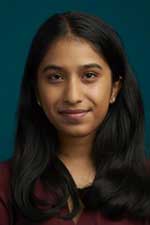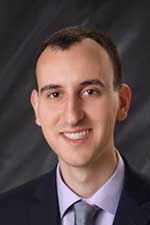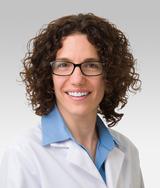Endocrinology, Diabetes & Metabolism Fellowship
The Endocrinology, Diabetes & Metabolism Fellowship at Northwestern University Feinberg School of Medicine prepares physicians for careers in academic and clinical endocrinology. Over two years, fellows receive exceptional clinical training and engage in research across clinical, translational and basic science domains, benefiting from our outstanding faculty and state-of-the-art facilities.
Our comprehensive core curriculum includes multidisciplinary patient care, physiology, pathophysiology, evaluation, therapy, genetics and molecular biology of endocrine disorders. Through rotations across subspecialties, fellows gain exposure to diverse patient populations and complex healthcare challenges, developing the medical knowledge, procedural competence, communication skills and professional ethics essential for independent practice.
Fellows have the opportunity to pursue basic or clinical research under expert faculty guidance, preparing them for roles as clinician-scientists or academic leaders. This emphasis on scholarly activity has driven a strong track record of graduates securing junior faculty positions at prestigious institutions nationwide.
About the Fellowship
Education
Core educational conferences are essential to our program; they include the following.
- Core Didactic Curriculum (Weekly): Weekly lectures cover all major endocrine topics, including physiology, pathophysiology, evaluation, therapy, genetics and molecular biology of endocrine disorders. Key endocrinology faculty and selected experts from other disciplines present these sessions. Assigned readings from primary literature accompany each lecture, and an annually updated comprehensive reading list is available electronically via Northwestern’s file-sharing service.
- Research Conference (Biweekly): The Endocrinology Seminar Series invites local regional and national experts to present recent research findings every other week.
- Clinical Case Conference (Biweekly): Fellows present recent cases from inpatient consultations and outpatient clinics. Additionally, a multidisciplinary high-risk thyroid cancer tumor board meets monthly, where fellows discuss cases and management strategies with Division of Endocrinology faculty.
- Endocrine Practicum Series (Select Weeks): Fellows participate in practical sessions on clinical endocrinology topics such as diabetes technology insulin pumps continuous glucose monitoring DXA interpretation and thyroid biopsy during selected weeks.
- Journal Club (Select Weeks): Research faculty lead critical reviews of current studies and teach essential skills for appraising scientific literature in designated weeks.
- Wellness Curriculum (Select Weeks): Seminars focused on personal and professional wellness for Endocrinology fellows are held during selected weeks.
- Health Equity Curriculum (Select Weeks): Fellows receive education on social determinants of health specific to endocrinology through active learning modules didactics and readings in designated weeks.
- Board Review Series (Monthly): Monthly interactive sessions provide comprehensive review for endocrine board examinations.
- Summer Boot Camp: A two-week intensive program each July features focused lectures on core endocrine emergencies and basic endocrine management skills.
Research
All fellows are paired with a faculty research mentor early in the fellowship. Core mentors from the Endocrine Division and collaborating departments guide fellows on diverse clinical and basic research projects. Northwestern’s extensive research opportunities and collaborative environment are key strengths of our program. During the first two years, fellows dedicate time to clinical or laboratory research when not rotating on the inpatient endocrine consult service.
Our division includes innovative scientists leading cutting-edge research in metabolism and energetics. Notable projects include the Hyperglycemia and Adverse Pregnancy Outcome study, a two-decade, multi-site initiative advancing understanding of maternal glycemia and maternal-fetal risks. Faculty are committed to patient-centric research, bridging bedside and bench science. Basic science laboratories focus on metabolism regulation by circadian rhythms, islet cell function and the genetics of hyperglycemia and insulin resistance.
NUPEDHA
Qualified fellows can extend their research in a third training year through the Northwestern University Program in Endocrinology, Diabetes & Hormone Action (NUPEDHA). Supported by a Ruth L. Kirschstein National Research Service Award from the National Institute of Diabetes and Digestive and Kidney Diseases, NUPEDHA provides protected research time and comprehensive training. For over 30 years, NUPEDHA has supported trainees with excellent mentorship and career development resources. Find more information about NUPEDHA.
Clinical Experience
Our clinical training is based at:
- Northwestern Memorial Hospital
- Northwestern Medical Group
- Jesse Brown VA Medical Center
- Ann & Robert H. Lurie Children's Hospital of Chicago
The two-year fellowship focuses on comprehensive clinical training. In the first year, fellows rotate through the inpatient endocrinology consult service, general endocrine clinic, VA outpatient endocrinology clinic and various subspecialty rotations. In the second year, fellows continue with the continuity outpatient clinic, subspecialty rotations, VA outpatient clinic and inpatient consultations.
Training includes specialized clinics in:
- Thyroid ultrasound and fine needle aspiration
- Bone health
- Continuous glucose monitoring
- Pediatric endocrinology
- Diabetes in pregnancy
- Thyroid cancer
- Pituitary and adrenal disorders
- Lifestyle medicine and weight management
- Lipid disorders
- Female reproductive endocrinology
- Transgender medicine
Core Mentors
- Ron T. Ackermann, MD, MPH
- Grazia Aleppo, MD
- Grant D. Barish, MD
- Joseph T. Bass, MD, PhD
- Lisa Beutler, MD, PhD
- Christina E. Boots, MD
- Zulma Cardona, MD
- Mercedes Carnethon, PhD
- Kasey Coyne, MD
- Dina M. Elaraj, MD
- Jared Friedman, MD
- Allison J. Hahr, MD
- Wenyu Huang, MD, PhD
- Kristen L. Knutson, PhD
- Jelena Kravarusic, MD, PhD
- Robert F. Kushner, MD
- Clara Bien Peek, PhD
- Cord Sturgeon, MD
- Emily D. Szmuilowicz, MD
- Margaret Urbanek, PhD
- Amisha Wallia, MD
- Jeffrey Weiss, PhD
Eligibility
Education & Training
Fellowships are offered to MDs who have completed at least two years of postgraduate training in internal medicine in an ACGME-accredited program.
Board & Licensure
All applicants are expected to:
- Be board-eligible in internal medicine when beginning the fellowship
- Have completed the requisite predoctoral medical education, meet the postdoctoral training requirements and demonstrate clinical competence in the care of patients
- Have passed USMLE steps 1, 2 and 3 (as required for training)
- Be eligible for an Illinois medical license. In order to participate in the training program, fellows are required to have a temporary medical license
Citizenship & Residency
The NIH T32 Training Grant that supports most fellows during the research years requires U.S. citizenship or permanent residency status. Therefore, only U.S. citizens and permanent residents are eligible for positions on the T32 training grant and for a third year of fellowship.
- J-1 Visa Holders will be considered only for the two-year clinical track
- H-1B visas will not be considered.
Non-U.S. citizens who are entering a Northwestern ACGME-accredited training program are required to obtain visa sponsorship prior to beginning their program.
Minimum Position Requirements
- Outpatient general endocrinology continuity clinic (one half day per week)
- Outpatient VA continuity clinic (2 fellows per week; one in two weeks averaged over the two years of fellowship)
- Rotation through subspecialty outpatient clinics (up to three half-days per week when not rotating on the inpatient endocrinology consult service)
- Rotation on the inpatient endocrinology consult service, which includes weekend/evening call, as below. In addition to the assigned inpatient consult service months below, fellows may be required to spend additional time rotating on the inpatient consult service as back-up to the primary assigned fellow when needed. The number of months listed below are subject to change.
o 1st year fellows: 18 weeks per year
o 2nd year fellows: 8-10 weeks per year
- Participation in all didactic and educational conferences and activities
- Commitment to clinical or laboratory research project(s) under the mentorship of faculty mentor or mentors (fellows typically devote approximately 7 months of the first year and 9 months of the second year to research activities. During these months, fellows are additionally required to complete all outpatient and educational responsibilities.
- Fellow must strive for excellence in all aspects of patient care and teaching, including professional demeanor and conduct at all times. Fellows must be familiar with and adhere to all of the Endocrinology training program’s policies, as well as the Conduct and Responsibilities policies of McGaw, other policies of McGaw, and the policies of any McGaw member hospital.
- Fellows must have a valid Illinois medical license.
Application Process
The Division of Endocrinology participates in the Electronic Residency Application Service (ERAS). We do not accept any paper applications. For more information about ERAS, consult the ERAS website. In addition to ERAS, we also participate in the National Residency Match Program for applications. For more information, including deadlines, visit the National Resident Matching Program site.
We have committed to conducting all applicant interviews virtually for the 2025-26 recruitment cycle (including local applicants), consistent with the Recruitment Recommendations from the Association of Program Directors in Endocrinology, Diabetes and Metabolism (APDEM) Fellowship Recruitment Committee.”
Meet Our Fellows
First Year

Yogitha Dadi, MD
MD: S.V.S. Medical College
Residency: Southern Illinois University School of Medicine

Aiman Rehan, MD
MD: Dow Medical College
Residency: University of Oklahoma Health Sciences Center
Second Year

Estefania Abasolo Lopez, MD
MD: Pontificia Universidad
Residency: University of Wisconsin

Andrew Boutsicaris, MD
MD: Ohio State University
Residency: Loyola University
